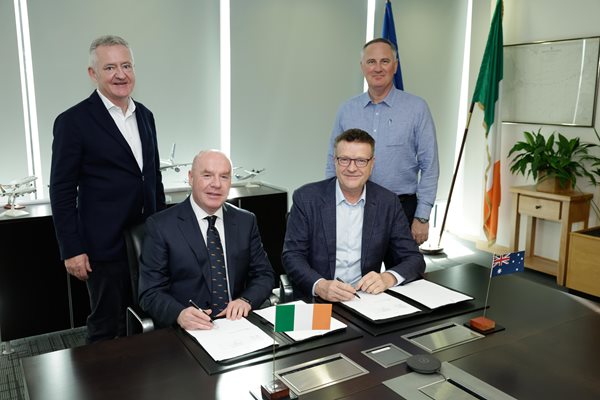29 October 2024

Dublin, Ireland – 28th October 2024 – AirNav Ireland and Airservices Australia have signed a Memorandum of Understanding (MoU) to collaborate and share expertise in air navigation services. With safety as the core remit of both companies, this partnership will enhance outcomes for the aviation sectors in both countries by leveraging shared knowledge and best practices. This will contribute to further enhancing the safety and efficiency of air traffic management.
AirNav Ireland is the Irish air navigation services provider (ANSP), responsible for managing the safe and efficient movement of several hundred thousand aircraft in Irish-controlled airspace. With a focus on safety, capacity, innovation, and environmental efficiency, AirNav Ireland consistently serves the needs of its customers and the wider aviation sector, both domestically and internationally.
The MoU outlines several areas in which AirNav Ireland and Airservices Australia will work together to enhance safety, drive innovation and improve operational efficiency, including:
- Recruitment and Training: Sharing expertise, training materials, and best practices to strengthen talent pipelines.
- Air Traffic Management Systems: Collaborating on the delivery of new air traffic management systems with a focus on safety and procedural innovations.
- Research and Development: Partnering on initiatives to enhance safety, foster innovation, share environmental expertise and address the evolving needs of air traffic management.
- Oceanic Airspace Communications: Exploring joint opportunities in the provision of communications in oceanic airspace.
- Airspace Changes: Sharing insights on airspace changes.
- Uncrewed Aircraft Systems: Working together to facilitate the safe integration of uncrewed aircraft into shared airspace.
- Staff Exchange Programme: Exploring the potential for a staff exchange programme in a manner that provides innovative options to staff while maintaining retention.
Dr. Peter Kearney, CEO of AirNav Ireland, emphasised the importance of international collaboration in addressing the rapidly evolving challenges of airspace management.
“Partnering with Airservices Australia allows us to exchange critical insights and expertise at a time when the aviation sector is experiencing significant transformation. The rise of new technologies and the need to accommodate emerging aircraft types are challenges shared by both organisations, and together, we can enhance safety and drive innovation,” said Dr. Kearney.
“This MoU is a crucial step in strengthening our operational capabilities. It provides us with valuable opportunities to collaborate on key areas such as workforce development air traffic management, and the provision of communication services. By working with Airservices Australia, we can continue to deliver world-class air navigation services and support the growth of the global aviation industry.”
Rob Sharp, Interim Chief Executive Officer of Airservices Australia, echoed these sentiments, noting the value of shared expertise.
“The challenges we are facing are not unique to Australia, and by working with our international peers, we can share knowledge that strengthens both local and global outcomes while fostering innovation,” Sharp said.






